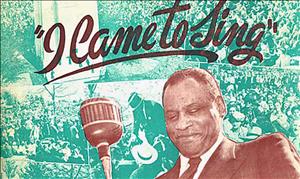On May 20, 1952, famed African American social activist, actor, and singer Paul Robeson (1898-1976) overcomes opposition from anti-communists, a press blackout, and an initial City Council ban on his appearance to lecture and perform in Seattle's Civic Auditorium (now the Opera House at Seattle Center).
This was not Robeson's first visit to Seattle or his first clash with its conservative and anti-communist elements. He passed through the city in January 1952 on his way to a Canadian labor rally in Vancouver, B.C., but U.S. officials barred him from crossing the border. Robeson drove back to Seattle and delivered his remarks by telephone.
Robeson returned in May of that year and addressed a cross-border audience (variously estimated at 25,000 to 30,000 to as high as 45,000 people) at the Blaine Peace Arch. Shortly after this, the Seattle City Council abruptly cancelled his scheduled May 20 lecture/performance in the Civic Auditorium on the absurd grounds he would "tend to cause antagonism to the Negro race." In truth, Robeson's outspoken advocacy of civil rights, socialism, and the Soviet Union had already made him a marked man amid the mounting McCarthyist hysteria of the time.
Robeson's appearance was part of a Northwest tour organized by Communist editor Terry Pettus, KIRO radio personality Jack Kinzell (who was fired for his efforts), and Seattle civil rights leaders Vincent Davis, Lester Catlett, and James McDaniels. They sued to lift the ban. On May 8, a Superior Court judge ruled in Robeson's favor, but this left fewer than two weeks for promotion, and The Seattle Times and Seattle Post-Intelligencer refused to advertise the concert/lecture. As a result, Robeson appeared before a half-empty hall, and the event barely broke even. He never returned to Seattle.
Forty-six years after this humiliating encounter, Seattle City Council Member Peter Steinbrueck submitted a resolution honoring the great activist/actor's April 9th birthday as "Paul Robeson Day." It passed without dissent.

